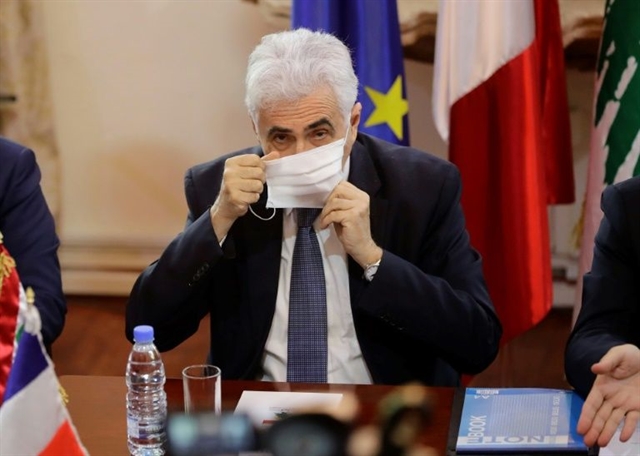 World
World


|
| Lebanon's Nassif Hitti, who resigned as foreign minister on Monday, pictured on July 23 before receiving his French counterpart Jean-Yves Le Drian in Beirut . — AFP/VNA Photo |
BEIRUT — Lebanon's foreign minister Nassif Hitti has resigned in protest at the government's failure to tackle a spiralling economic crisis, warning that if there is no will to reform "the ship will sink".
"I have decided to resign today as foreign minister," Hitti said in a statement on Monday, charging that the government had shown no will to initiate changes demanded by the International Monetary Fund (IMF).
"I participated in the government under the logic of serving one boss, which is Lebanon," the 67-year-old veteran diplomat added.
"But I found that in my country there are many bosses and contradictory interests.
"If they don't unite in the interest of the Lebanese people ... then the ship, God forbid, will sink with everyone on board," he added, warning that Lebanon risked becoming a "failed state".
His successor was named within hours as Charbel Wahbe, a former ambassador and advisor to President Michel Aoun, in an unusually swift move for a country where political appointments usually take months.
Lebanon is mired in its worst economic crisis since its 1975-1990 civil war, with runaway inflation and bank capital controls fuelling poverty, despair and angry street protests.
Prime Minister Hasan Diab's government, formed in January and billed as an administration of technocrats, has struggled to secure international financial support.
Hitti's resignation comes after France's top diplomat Jean-Yves Le Drian during a visit last month scolded Lebanon's leadership for failing to move to save the country from collapse.
The UN's Special Coordinator for Lebanon Jan Kubis tweeted Monday that Hitti's resignation sent "quite a message."
"Will this cry of deep frustration move #Lebanon to finally work on reforms, on measures taking care of the Lebanese, sinking every day deeper into poverty and desperation?" he wrote.
The outgoing foreign minister too urged officials to "reconsider many of their policies and practises so that the nation and its citizens are given priority over all other considerations".
'Total confusion'
Lebanon is grappling with a steep decline in the value of the Lebanese pound, with nearly half the population now living below the poverty line and more than a third of the workforce unemployed.
The free-falling economy has sparked mass protests since October against a political class widely accused of being incompetent, corrupt and serving sectarian rather than national interests.
The government, which defaulted on its sovereign debt for the first time in March, has pledged an ambitious raft of reforms and two months ago entered into bailout talks with the IMF.
However, the negotiations have stalled, with two top members of the government's own team resigning, allegedly in frustration at its lack of commitment to reform.
The government says it needs more than US$20 billion in external funding, which includes $11 billion pledged by donors at a Paris conference in 2018 that was never delivered due to lack of reforms.
Hitti's resignation shows "that Lebanon is in a state of total confusion", said Hilal Khashan, a professor at the American University of Beirut.
"This government of so-called technocrats has to always refer back to those who put it in office before it can act on any matter," he said, meaning that it "is not autonomous".
The latest round of political wrangling came as Human Rights Watch warned that the "acute economic and political crisis" in Lebanon is "endangering people's basic rights.
"Lebanon's people are being robbed of basic rights every day while politicians squabble over the size of the country's financial losses and hamper efforts at reform," said Aya Majzoub, the group's Lebanon researcher.
Diab's cabinet was formed with the backing of the powerful Shiite movement Hezbollah and its political allies, including the Free Patriotic Movement, founded by Aoun.
Lebanese media cited several reasons for Hitti's resignation, including reports that he was displeased with how Lebanese officials were encroaching on his prerogatives and handling diplomatic ties.
Hitti was reportedly sidelined from a meeting between Le Drian, Diab and several cabinet ministers. — AFP




